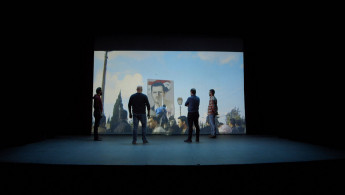Our Memory Belongs To Us: Three friends' transformation from common Syrian citizens to war journalists
This quote effectively summarises the essence of Rami Farah and Signe Byrge Sørensen's new documentary Our Memory Belongs to Us, part of the main competitive strand of this year's online edition of CPH:DOX (21 April-12 May 2021).
The feature, a Syrian-Danish-French-Palestinian co-production, centres on the emotionally intense reunion of three activists and citizen journalists, Yadan, Odai and Rani, on the occasion of the Syrian uprising's 10th anniversary. It is not the type of reunion one would expect, though.
Sørensen and Farah decide to organise the meeting on a theatre stage somewhere in Paris. Farah himself goes up on stage and begins interacting with the three friends. He confronts them with a number of videos from the early years of the revolution – footage that was smuggled out of Syria in 2012, and which the three men have filmed themselves or which, for some reason, changed their lives.
Read more: The cradle of Syria's revolution: Daraa ten years on
After a short prologue, Farah asks them: "How would you have introduced yourself before the revolution in 2011?" The three exiled journalists give their answers while standing in front of the camera. All of them are from the south-eastern city of Daraa.
At the time, Odai was a promising young volleyball player, Rani was a 30-year-old law student and Yadan, curiously, talks through his love for literature and for his mother, a "role model in giving and sacrificing."
 |
The film documents very accurately these three friends' transformation process from common citizens to activists and as journalists forced to tell the world what was going on in their country |  |
The film documents very accurately these three friends' transformation process from common citizens to activists and as journalists forced to tell the world what was going on in their country.
Armed with smartphones and handycams, the group reports Syria's most turbulent days as well as the enthusiasm in supporting a true change, hoping for the end of Bashar al-Assad's authoritarian regime.
In particular, the documentary is successful in imbuing the constant "smell of death" Yadan, Odai and Rani used to experience – this is not only evident through the cruelty depicted in the archive footage but, especially, from their conversations revealing their mixed feelings.
Throughout the picture, the three friends disclose their special bond with Abou Nimer, another activist-turned-journalist, adventurously reporting on the crisis for Al Jazeera.
Abou is described as a pleasant and humorous man. In some of the archive footage, spectators will see him poorly disguised and wearing a black wig, along with a fake beard and moustache. Moreover, he will frequently stumble through his speeches.
While these excerpts show something unexpectedly comical, the three men rightfully highlight that their friend was doing his best to hide his identity to protect his dear ones.
We also get to know that the man was later brutally killed during a shooting. There is also a video documenting his demise and his friends do not want to watch it until the end, for obvious reasons.
 |
Our Memory Belongs to Us is more than a long account of the Syrian civil war's early days but, rather, a bold piece unpacking the value of friendship, courage and civic consciousness while going through hardship |  |
On the whole, the two directors' aesthetic solutions are simple but effective.
The stage allows Farah and the three journalists to move freely under the camera's eye. They are free to walk, sit, hug each other or even ignore what's being screened.
Farah's presence is well balanced, as he acts very discreetly as a precious support and a point of contact for the subjects to tell their stories.
The score, courtesy of clarinet player Kinan Azmeh (Lucas Jedrzejak's The Confessional), tunes in at the right moments, with great tact and consideration.
These simple elements allow the documentary to engage with a wider audience and even involve someone who is not familiar with Syria's recent history.
Here, contextualisation is minimum and facts are explained plainly, as the filmmaking duo's vision remains focused on the men's emotional turmoil and how their everyday life had changed in the blink of an eye following the uprising.
 |
Farah and Sørensen's documentary tell the viewers how coping with loss together is the only way to go through traumas and keep memories alive, while fighting for a better future |  |
All things considered, Our Memory Belongs to Us is more than a long account of the Syrian civil war's early days but, rather, a bold piece unpacking the value of friendship, courage and civic consciousness while going through hardship.
Read more: How Syria's war defined a decade
In the final sequence, Farah says: "How one does survive? By forgetting? By remembering? I don't want to forget." These terrible memories are clearly – and always will be – part of the three friends' identity and a true, full freedom from pain will be always impossible to achieve.
However, Farah and Sørensen's documentary tells the viewers how coping with loss together is the only way to go through trauma and keep memories alive, while fighting for a better future.
Yadan, Rani and Odai decide to share – at least in part – their pain and thus participate in a powerful act of catharsis.
Davide Abbatescianni is an Italian Film Critic and Journalist based in Cork, Ireland.
Follow him on Twitter: @dabbatescianni



